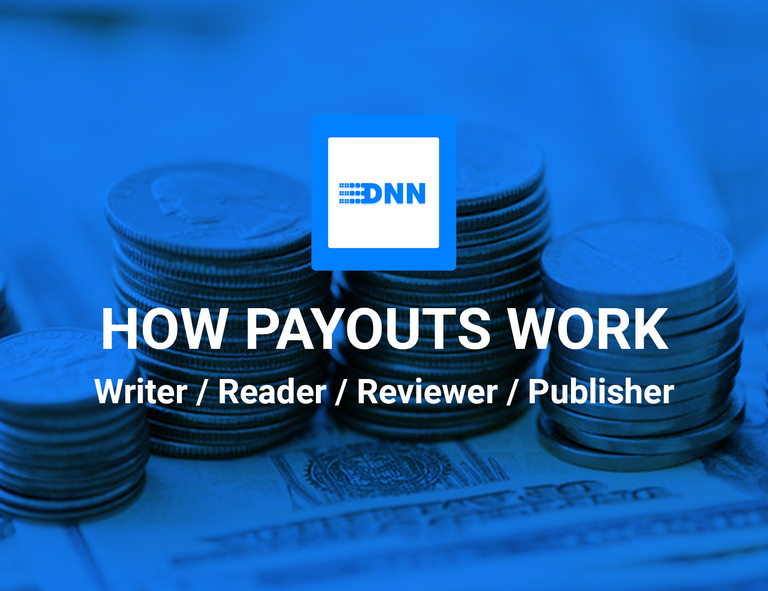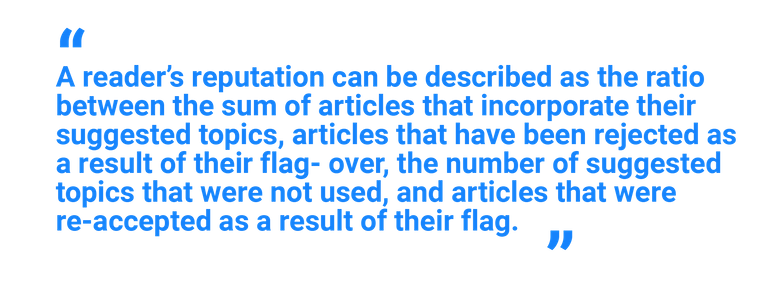
Writer Example
A user who writes for the DNN platform starts out by acquiring DNN tokens. DNN tokens can either be obtained on the platform or purchased. DNN tokens are the fuel that give writers the ability to submit their articles to the network for a complete assessment by reviewers. For the sake of this example, our writer will start with 10 DNN. Having obtained DNN tokens, the writer can construct an article and submit it to the DNN network for review. Upon submitting the article, the writer will need to pay a writer’s fee dictated by the network. We’ll assume the writer fee is 2 DNN tokens, leaving our writer with 8 DNN tokens.
Depending on the outcome of an article review, the writer earns DNN tokens proportional to their reputation. Each writer starts out with a reputation equal to 1. The reputation of a writer is nothing more than the ratio between the number of articles that have been accepted and the number of articles that have been rejected. In the case where the writer has no rejected articles, a value of 1 will be put in its place to prevent an invalid ratio. In this example, let’s assume that the writer submitting the article starts out with a reputation of 2 (accepted articles) over 1 (0 rejected). At the conclusion of each review, DCC tokens are minted by the platform of an amount equal to the summation of the reputation of the reviewers assigned and the writer submitting. For the sake of this example, we’ll assume that each reviewer has a reputation score of 1. The summation of reputations would mean 9 DNN tokens (1 for each of the seven reviewers plus 2 for the writer) will be minted at the conclusion of the review (i.e. when each reviewer has casted a vote). Assuming the article gets accepted, the writer will earn 2 DNN tokens. The goal of each writer is to accumulate as many DNN tokens as possible. The reward pool acts as a bucket that collects DNN tokens from each action carried out by every user of the platform.
Reader Example
Every reader on DNN starts by out acquiring DNN tokens that can either be obtained from the platform or purchased. DNN tokens allow the reader to influence the platform in the form consuming, tipping, liking, commenting, or flagging articles for subsequent review. Let’s assume that for this example the reader starts out with 10 DNN tokens. In order for a reader to view articles published to the DNN network, a rather small micropayment of DNN tokens is needed (which gets determined by the network) for each unique article that gets viewed. In our example, let’s say the reader views 10 articles, paying 0.002 DNN tokens for each article, for a total of 0.02 DNN tokens paid into the system. This would leave the reader with a balance of 9.98 DNN tokens. Similarly, liking and commenting both cost DNN tokens that get deducted from the readers total DNN balance as they are performed.
Each reader can earn DNN tokens by flagging articles for review and suggesting topics that are considered by writers. Similar to writers and reviewers, readers earn DNN tokens proportional to their reputation. A reader’s reputation can be described as the ratio between the sum of articles that incorporate their suggested topics, articles that have been rejected as a result of their flag- over, the number of suggested topics that were not used, and articles that were re-accepted as a result of their flag. Each reader will start with a reputation of 1. Since the reputation is ratio, a zero denominator will be replaced with a 1.

Similar to writers, readers earn DNN tokens that get minted during the review process equaling their reputation. A reputation score of 2 over 1 would mean the reader earns 2 DNN tokens for their contribution. Let’s assume the reader suggests flags an article for inaccuracies, which ultimately is rejected after being re-reviewed. This would yield the reader 2 DNN tokens for their efforts.
Reviewer Example
Each reviewer starts by obtaining DNN tokens, either by purchasing them or by obtaining them on the platform. Reviewers use DNN tokens as a way of getting considered for review. Let’s assume that a reviewer starts out with 10 DNN tokens. For this reviewer to be considered for assignment by the DNN network, the reviewer must pay DNN tokens up to the specified cap, dictated by the network. The higher the number of DNN tokens a reviewer puts out, up to the cap, the quicker they will be selected. However, to prevent top DNN token holders from strong-holding the review process, every reviewer who places a bid, will “eventually” be assigned an article. For the sake of our example, let’s assume that the review pays 5 DNN tokens into the selection pool to be considered for a review. The tokens paid into the selection pool will be held there until the conclusion of the review process once the reviewer has been assigned an article.

Once the reviewer has been assigned an article and has casted a vote, they will earn DNN tokens proportional to their reputation. A reputation value of 3 will entitle the reviewer to 3 newly minted DNN tokens, while a reputation score of 1 would result in 1 DNN token. Every reviewer starts out with a reputation score of 1. Should the reviewer opt to not cast a review in time, they will lose their initial DNN token bid (which now acts as a security deposit) and will no longer be entitled to newly minted DNN tokens. For the sake of our example, let’s assume that each reviewer votes in a timely fashion, and has a reputation score of 1 (including our example reviewer). At the conclusion of the review process, our example reviewer would earn 1 DNN token and will have their 5 DNN tokens returned to their account.
Publisher Example
Each publisher node must start out by obtaining DNN tokens, either by purchasing them or obtaining them on the platform. Unlike reviewers, readers, and writers, publishers earn DNN proportional to their DNN token holding. The more DNN tokens that a publisher node accumulates, the more DNN tokens will need to be minted. In a similar sense, the number of DNN tokens that a publisher node holds with respect to every other publisher node is the equivalent of their reputation. As with any other type of contributor, publishers earn DNN tokens that get minted at the conclusion of the review process.
Unlike the other types of contributors that directly influence the number of DNN tokens that get minted based on their reputation, a fixed number of DNN tokens will be minted for all publisher nodes. These newly minted DNN tokens will then be distributed according to the percentage of DNN tokens that each publisher node holds with respect to all publisher nodes.
The goal of each publisher is to accumulate as many DNN tokens as possible, while counter balancing that with the number of DNN tokens they hold. For a publisher node that holds 50% of the DNN tokens out of the total active publisher nodes, 50% of the DNN tokens minted will be awarded. So a publisher node with a balance of 2 DNN tokens, which accounts for 50% of the DNN tokens held by publisher nodes, would be entitled to 5 DNN tokens out of 10 DNN tokens (although this number will vary depending on what the network decides) minted.
.png)
Hi! I am a robot. I just upvoted you! I found similar content that readers might be interested in:
https://medium.com/dnnmedia/how-dnn-payouts-work-45c6c7c05734
Yes, blockchain technology is changing the world and DNN is certainly part of that change to make things better.